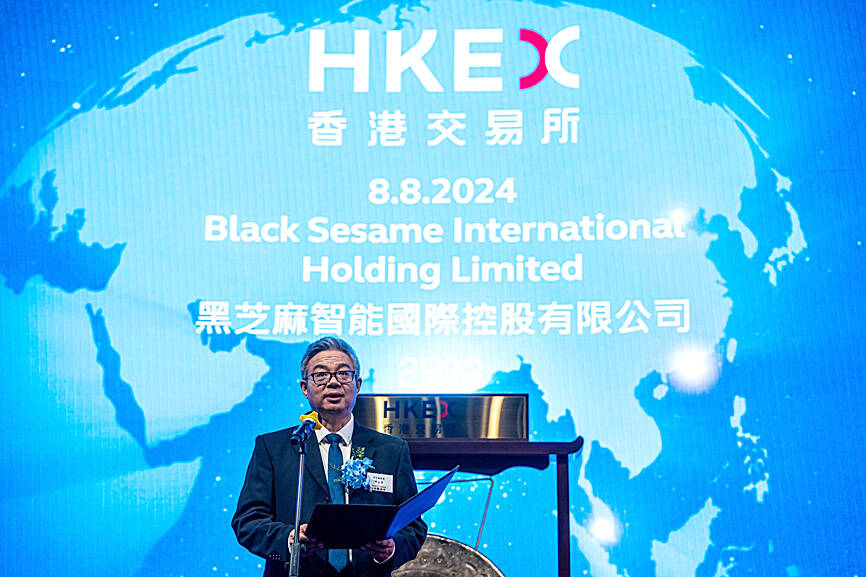Shares of artificial intelligence (AI) chipmaker Black Sesame International Holding Ltd (黑芝麻智能) tumbled as much as 35 percent on their debut, dealing a blow to Hong Kong’s efforts to lure more technology listings.
Shares in the company backed by Xiaomi Corp (小米) yesterday fell to as low as HK$18.28 on the Hong Kong Stock Exchange. They had been priced at HK$28, the bottom of the marketed range in an initial public offering (IPO) that raised HK$1.04 billion (US$133.5 million).
The listing comes as global markets are recuperating from a rout earlier this week. The stock’s reception is a setback for Hong Kong as it strives to revive its equity market, which has seen moribund volumes of IPOs and liquidity concerns stemming from the region’s economic sluggishness.

Photo: Bloomberg
Nearly 95 percent of the shares offered were snapped up by just five investors prior to the first day of trading, according to a Wednesday filing from the company, which specializes in chips used in autonomous driving systems.
A subsidiary of Guangzhou Automobile Group Co (廣州汽車集團) and an investment unit of Ningbo Joyson Electronic Corp (寧波均勝電子) participated as cornerstone investors.
“Given the concentrated share take up, combined with the tight float, listing performance could be distorted,” said Clarence Chu, an analyst at Aequitas Research Pvt who publishes on the platform Smartkarma.
The deal’s international portion was subscribed 1.05 times.
That reflects weak demand from institutional investors, Chu said.
IPOs in Hong Kong have raised US$2.44 billion so far this year, down 7.6 percent from the same period last year and far below 2021 levels, Bloomberg data showed.

Taiwanese suppliers to Taiwan Semiconductor Manufacturing Co. (TSMC, 台積電) are expected to follow the contract chipmaker’s step to invest in the US, but their relocation may be seven to eight years away, Minister of Economic Affairs J.W. Kuo (郭智輝) said yesterday. When asked by opposition Chinese Nationalist Party (KMT) Legislator Niu Hsu-ting (牛煦庭) in the legislature about growing concerns that TSMC’s huge investments in the US will prompt its suppliers to follow suit, Kuo said based on the chipmaker’s current limited production volume, it is unlikely to lead its supply chain to go there for now. “Unless TSMC completes its planned six

Intel Corp has named Tasha Chuang (莊蓓瑜) to lead Intel Taiwan in a bid to reinforce relations between the company and its Taiwanese partners. The appointment of Chuang as general manager for Intel Taiwan takes effect on Thursday, the firm said in a statement yesterday. Chuang is to lead her team in Taiwan to pursue product development and sales growth in an effort to reinforce the company’s ties with its partners and clients, Intel said. Chuang was previously in charge of managing Intel’s ties with leading Taiwanese PC brand Asustek Computer Inc (華碩), which included helping Asustek strengthen its global businesses, the company

Power supply and electronic components maker Delta Electronics Inc (台達電) yesterday said second-quarter revenue is expected to surpass the first quarter, which rose 30 percent year-on-year to NT$118.92 billion (US$3.71 billion). Revenue this quarter is likely to grow, as US clients have front-loaded orders ahead of US President Donald Trump’s planned tariffs on Taiwanese goods, Delta chairman Ping Cheng (鄭平) said at an earnings conference in Taipei, referring to the 90-day pause in tariff implementation Trump announced on April 9. While situations in the third and fourth quarters remain unclear, “We will not halt our long-term deployments and do not plan to

TikTok abounds with viral videos accusing prestigious brands of secretly manufacturing luxury goods in China so they can be sold at cut prices. However, while these “revelations” are spurious, behind them lurks a well-oiled machine for selling counterfeit goods that is making the most of the confusion surrounding trade tariffs. Chinese content creators who portray themselves as workers or subcontractors in the luxury goods business claim that Beijing has lifted confidentiality clauses on local subcontractors as a way to respond to the huge hike in customs duties imposed on China by US President Donald Trump. They say this Chinese decision, of which Agence